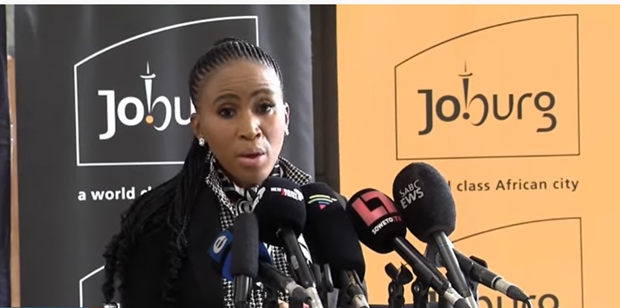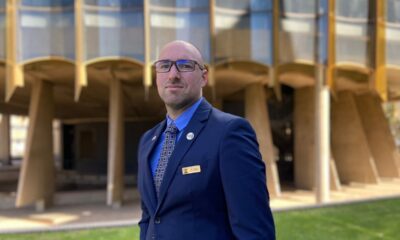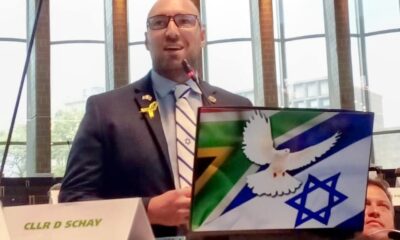
News

Al Jama-ah hardliners put Jozi DA in tough corner
The multi-party Democratic Alliance (DA)-led coalition in the City of Johannesburg hangs in the balance as the small Al Jama-ah party this week dramatically dropped out of coalition talks over ideological differences involving Israel.
This political snubbing by the anti-Israel party has left the DA three votes short of a majority going into the first sitting of the council on Thursday, 13 January.
The implications could be disastrous for residents of the city desperate for change and increased service delivery, say insiders.
At the time of going to press, the stakes were high for the DA-led coalition with the DA potentially finding itself in a tight corner, clinging to power.
“This is hardly surprising,” said election analyst Wayne Sussman.
“The Al Jama-ah party traditionally and currently prefers to work with the African National Congress [ANC], being ideologically closer to the ANC, so while this may be a setback for the DA, it should have been expected. The bigger news is that the DA thought it could count on the Al Jama-ah votes.”
Al Jama-ah turned down the DA due to its perceived support of Israel, taking its three seats with it.
Sussman said there were still a number of other smaller parties which the DA would be looking at, and would hope to get enough votes to get over the 50% mark.
However the situation remained unpredictable at the time of going to press, with the DA potentially finding itself short of vital votes in upcoming motions in the city.
The DA was forced to form coalition governments in Gauteng’s hung metros of Johannesburg, Tshwane, and Ekurhuleni after the Economic Freedom Fighters (EFF) handed it the mayoral chains rather than support the ANC.
This week’s turn of events has potentially left the door wide open for the ANC to try to form a coalition to take power from the DA. This, however, won’t be possible without the support of the EFF, which this week said it would keep the ANC out of power. EFF leader Julius Malema said at the Siyabonga rally in KwaZulu-Natal on 8 January that the EFF would work with all opposition parties to keep the ANC out of power.
Insiders say that the EFF knows it’s better for the party’s growth trajectory and prospects to have a weaker ANC than a weaker DA, even if it’s not on the same page as the DA.
The question is whether the DA will have to, as it did in 2016, count on the EFF’s vote to govern the City of Johannesburg in order to pass the budget and elect chairpersons of oversight committees.
This all remains to be seen.
Sussman said the DA was “chancing it”.
“Three seats is important. Historically, Al Jama-ah has been much closer to the ANC. When coalitions are flimsy, parties will do anything to stay in power, even negotiate with parties that are unlikely to support it. It’s easier to speak to one party with three seats than three different parties with one seat.”
The DA has put itself in a tough corner, experts say.
Meanwhile, news that the anti-Israel party pulled its three votes has been met with disgust and disappointment.
The South African Jewish Board of Deputies (SAJBD) said it was “outraged” that Al Jama-ah had put a distant conflict above the interests of its own citizens.
“The political party Al Jama-ah is seemingly attempting to stonewall and obstruct the functioning of the City of Johannesburg by putting a foreign conflict above the interests of its own citizens. Our landscape is such that representatives from across the political spectrum are expected to work together to provide leadership and good governance. Joburg is struggling to provide its own residents with electricity, water, functioning transport infrastructure, healthcare, and other social services. If there ever was a time to for our politicians to roll up their sleeves and get work done, it’s now.”
“It is unclear what ‘supporting’ Israel means,” said Harold Jacobs, the Gauteng chairperson of the SAJBD. “The majority of countries, including South Africa, support a two-state solution, as do the majority of our political parties. The two-state solution is clearly not supported by Al Jama-ah, which is attempting to introduce extremist views into Johannesburg. In essence, it seems that Al Jama-ah wants no Israel. We want no potholes, functioning hospitals, and a world-class city that Joburg promises to be.
“We call on all our political parties to work together in the interests of their own citizens, and not allow an extremist, anti-peace, and single-focused issue to be the deciding factor in our local politics.”
Said DA councillor Daniel Schay, “I’m disappointed that a party has chosen to put a complex, 9 000km away conflict ahead of the residents of Johannesburg, where it has been elected to serve. I have full faith in the mayor and the chief whip and everyone else in power to assess potential coalition partners, and that they will engage with partners who are able to share our values and the values of the coalition, and put the residents of the city first. Also that they won’t simply allow people on board just for the sake of retaining power, but it will revolve around residents coming first and there will be no compromise on that, otherwise we are just repeating what the previous regime did.”
Insiders say clashes in ideology existed even before the coalition talks took place, and ask whether the coalition was stable to begin with or if there were instabilities at the time of announcing the multi-party government.
It’s understood that local Al Jama-ah councillors initially showed willingness to join the coalition, but when it reached the ears of its national leaders, it was considered unacceptable.
The first council sitting will, without doubt, be tough for the multiparty coalition at a time when stable coalition is vital to ensure service delivery.











Joanne
January 13, 2022 at 10:52 pm
Really !!! I cannot belive that the Al- Jama wants to link our local government issues with the issues in the Middle East that has absolutely nothing to do with the local South African, half of which have never even been to the middle east
Ismail Sahib
January 18, 2023 at 5:59 pm
If governments around the world remained concerned only with their local issues and did not bother pressuring South Africa through sanctions and boycotts we black South Africans would not be free today. Those who have been subjected to opression can identify with the pain of the oprressed. Those who benefitted from the opression would make the comments you have.